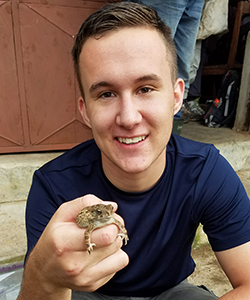Meet Jakub Zegar

Degree: BS Environmental Science '20
Research Interests: Conservation biology, herpetology, amphibian thermoregulation and disease spread
Co-ops:
-Research Experiences for Undergraduates (REU) Participant, the Richards-Zawacki Laboratory, University of Pittsburgh
- Research Technician, the Patrick Center for Environmental Research, the Academy of Natural Sciences of Drexel University
Extracurricular activities: Drexel Naturalists’ Association, Undergraduate Research Leader
What kind of research are you interested in?
Broadly, I am in interested in conservation biology and herpetology (the study of reptiles and amphibians). Currently, my specific research interests lie within determining the best way to model amphibian body temperatures in the field. I use a variety of methods for my research including agar models, mechanistic niche modelling, and field collected data.
Amphibians are an incredibly imperiled taxon, and as ectotherms, they may be particularly sensitive to environmental changes. My research is important because, ultimately, the ability to model amphibian body temperatures may allow us to predict changes in behavior, physiology, and potentially disease risk in response to changes in the environment.
What were some of your most memorable travel experiences through Drexel?
In the summer of 2017, I was afforded the opportunity to travel to Cameroon on a fully funded research and study abroad program with the Gonder Lab of Drexel University. It was an intensive three-week long program in which students and professors from the U.S., Cameroon, and Equatorial Guinea worked collaboratively on various research projects.
We spent most of our time in the deep jungle of Mbam Djerem National Park, where we collected data with individuals who became life-long friends. I made some of the best, most enjoyable, and funniest memories of my life here.
You share facts and perspectives about the animals you encounter out in the field on Instagram @jakub.zegar. What is the goal of your Instagram account?
The goal of my Instagram account is to educate others about animals and the threats that they are facing. Nature is beautiful, but unfortunately, nature is also disappearing. Forests are being cut down thousands of acres at a time, organisms are going extinct at unprecedented rates, and plastics in the ocean will soon outnumber fish. I think one way to begin to mitigate these issues is to expose people to them. Some may then decide to make changes in their lifestyle or even vote for candidates that share values based in environmental stewardship. Earth is suffering, but by making the right choices, we can hopefully begin to move forward in the right direction.
Check out some of Jakub’s Instagram posts here!
How did you become interested in science education, specifically related to ecology?
I’ve always been fascinated with nature, and I’m talkative — so naturally, I’ve always wanted to share that with others. In recent years, however, I have taken to sharing my fascination and knowledge a bit more seriously. I even decided to pursue a STEM education minor at Drexel.
A lot of my motivation for science education has come from encounters with people who are unaware or less educated about environmental issues. Having gotten into hundreds of arguments about climate change, habitat destruction, species conservation and just plain old respect for the environment, I realized the importance of educating the youth. And a good way to do this is with photos of cute and interesting biota!
What advice do you have for a high school student looking for an undergraduate program?
It’s okay if you don’t know what to major in or focus on. Look at your interests as broadly as you can and enter a field or program that is related. Then, gather as many experiences as you can. There is so much pressure to know exactly what you want to do in life, but do your best not to let this force or fake your interests. Chances are good that you haven’t yet discovered that which you are truly interested in and passionate about. Gather as many experiences across broad disciplines as possible – you’ll find your niche.